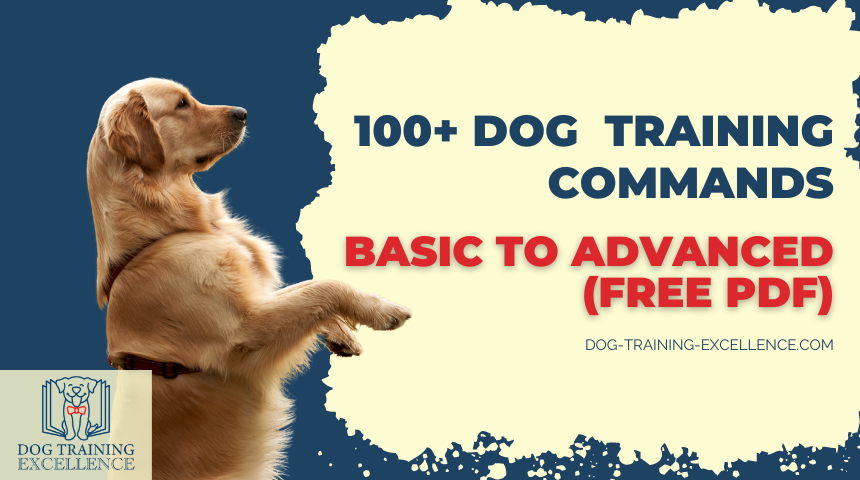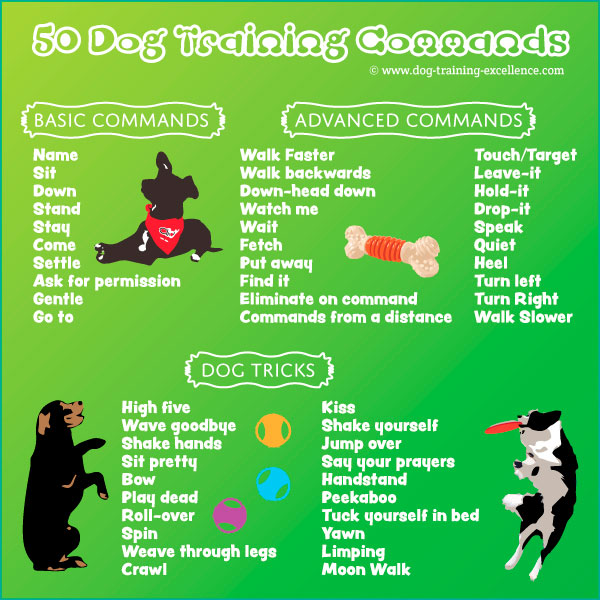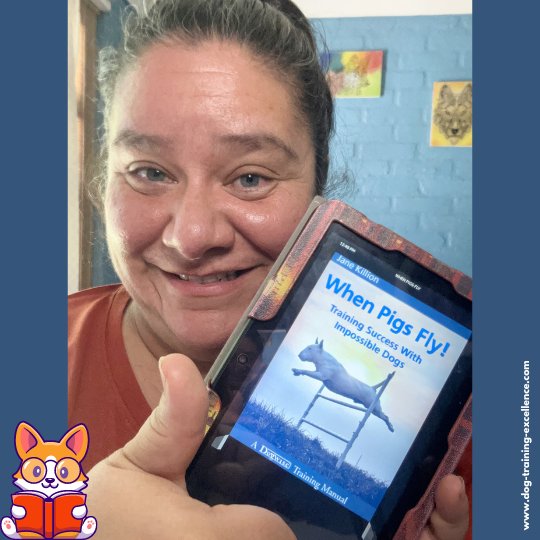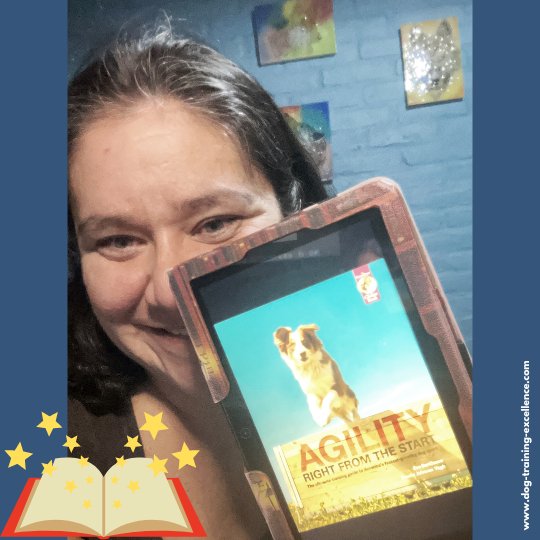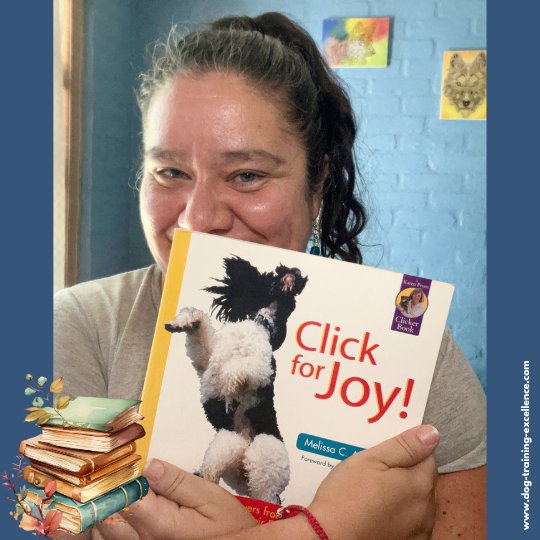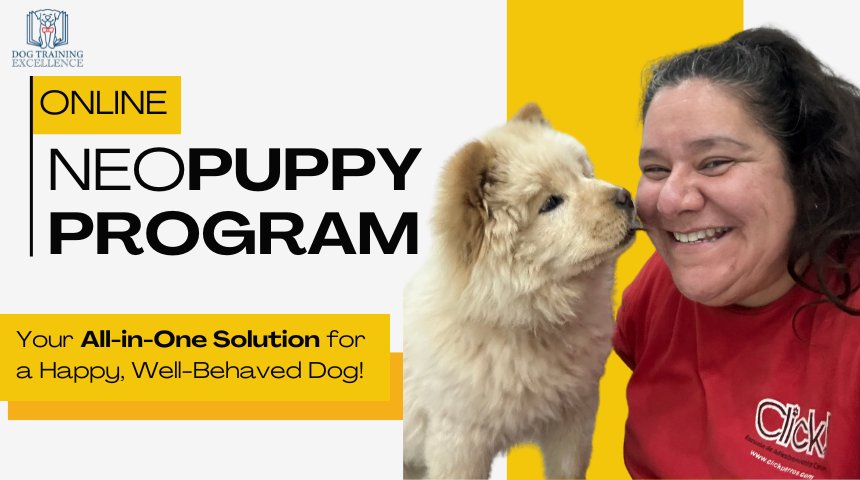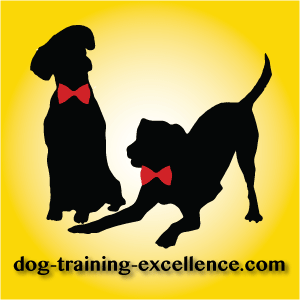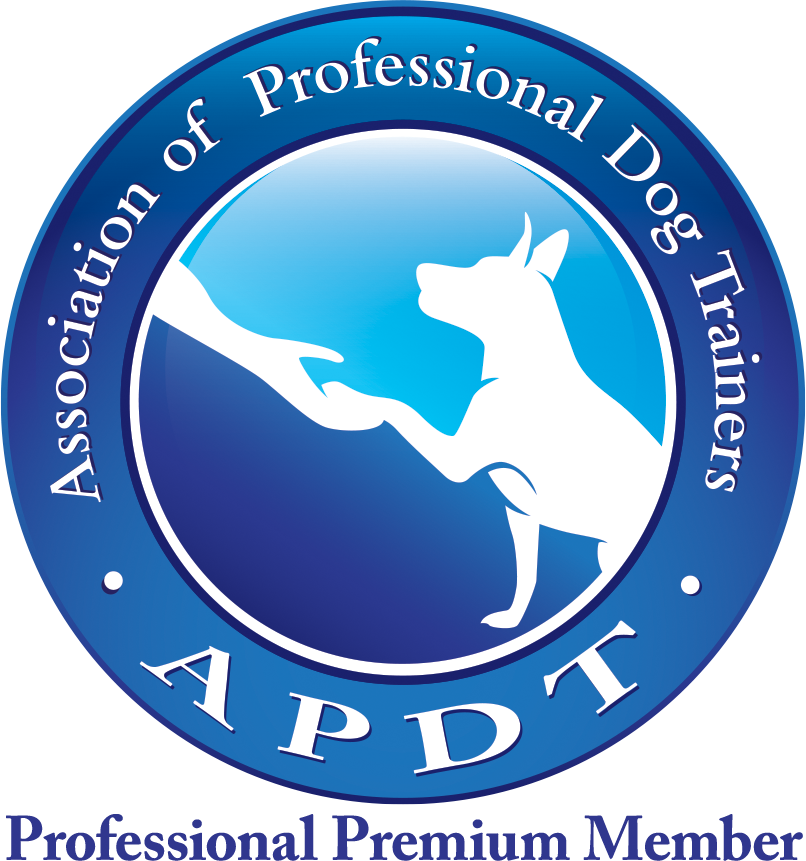I try to write my posts as unbiased as possible and recommend the products I consider to be useful and the best. I use affiliate links, this means that–at no extra cost to you–I can make a commission on a purchase you make after clicking on them. As an Amazon Associate I earn from qualifying purchases.
100+ Dog Training Commands
Basic to Advanced (Free PDF)
Need a list of dog training commands? I have compiled a list of dog training cues and hand signals for you to have the best time with your dog! You will also find step-by-step tutorials to get you started. Teach your pet basic to advanced behaviors on cue and even teach your dog to respond with distractions!
Teaching your dog cues and signals creates a language between you and him/her. When your dog understand you, he feels safer because he knows what to do (and know he will also earn a reward!).
Article Highlights:
What are dog training cues?
Dog training commands can be hand signals, voice commands, even tactile cues, or a mix of them. Most dogs will learn hand signals more easily than verbal cues but you can eventually teach them to recognize many different dog obedience commands. Tactile cues are ideal for blind and deaf dogs.
You can even use words in a different language, for example it is very popular to use German dog commands, specially with German Shepherds, or dog commands in Spanish. The advantage of using words in a different language is that your dog will learn to recognize and differentiate the sounds you make when talking to someone else vs talking to your dog.
Regardless of which language or dog training cue you want to use with your pet, you will find a list of basic dog commands and advance obedience commands to teach along with easy to follow tutorials.
Trainer’s Toolkit - Before you start practicing, you’ll need:
Before you start practicing these commands, make sure you have the right tools. These are the same ones I use with my own dogs and clients every day, they’ll make training smoother, cleaner, and more fun.
✅ Clicker & Treat Pouch Combo:
I highly recommend these silicone treat pouches, they’re flexible, durable, and super easy to clean.
And trust me… after a few sessions with chicken or liver treats, you’ll really appreciate that!
👉 Check the latest price on Amazon
✅ Yummy (but Healthy) Training Treats:
Treats can make or break your session. If your dog’s food-motivated, lucky you! Any small treat works.
But if your pup needs something extra special for her hard work, these healthy training treats never disappoint.
👉 See my favorite treats on Amazon
Disclosure: As an Amazon Associate, I earn from qualifying purchases. I only recommend products I personally (or my clients) use and trust.
List of basic dog commands and hand signals
I consider the following dog training commands basic because every dog parent should teach them to their pet. They make daily life with your furry friend easier, calmer, and far more enjoyable. From polite greetings to rock-solid recalls, these cues form the foundation of good manners and clear communication.
As you explore this list, you’ll find helpful links to detailed guides on specific training methods and obedience tips. Each page takes you one step closer to a confident, well-behaved companion you’ll be proud to take anywhere.
What are the 7 basic commands for dog training?
Yes, I know...there are 9 in this list. But a marker word is technically not a command, just a signal (a very important one to teach your dog!) and "Free" is technically part of "stay", they are usually taught together. So, 7 commands + 2 important components of training!
| Command | Hand signal | Description |
|---|---|---|
| 1. Good dog! |  One hand doing a "thumbs up" signal |
This is also known as a marker word, used to mark the correct behavior and signal the dog he/she has earned a treat. |
| 2. Name recognition | Your dog is unique! You can make up any hand signal if you want to use one with your dog, otherwise it is usually a verbal command. | This is also known as a marker word, used to mark the correct behavior and signal the dog he/she has earned a treat. |
| 3. Sit | 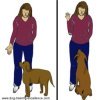 Hand moves palm up from leg to shoulder. Alternative, index finger points down. |
Request the dog to sit on its hindquarters. |
| 4. Down | 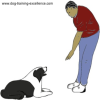 Hand moves from shoulder to leg with palm down. |
Requests the dog to lay down. |
| 5. Stand |  Hand moves like a swing with pal up from leg backwards. |
This command asks the dog to stand from a sitting or a down position. |
| 6. Stay | 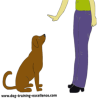 Hand with palm up (like saying "stop"). |
Requests the dog to stay in a specific place and position (sit, down or stand) for a specific time. The dog should be released with a marker word or another word. |
| 7. Free or Go | 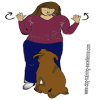 Both hands move with palms upto the sides of the hear (similar to ASL for "all done"). |
This is a release word used to tell the dog he is free to stop the previous request, for example he is free to move from a "Stay" cue. Go (Los) can also be used to let the dog know he is free to go outside, walk, etc. |
| 8. Settle |  Hands to the side, thumb and index finger touch like in Yoga mudras. Alternative:Both hands palms down make a downward movement from chest to floor. |
Calm down, go from an active state to a quieter relaxed state. |
| 9. Come | 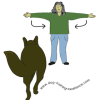 Standing or crouching with arms opened wide. Alternative: patting on the legs alternating with opening arms wide. |
Asks your dog to come to you when called. |
🐾 A Little Trainer Story
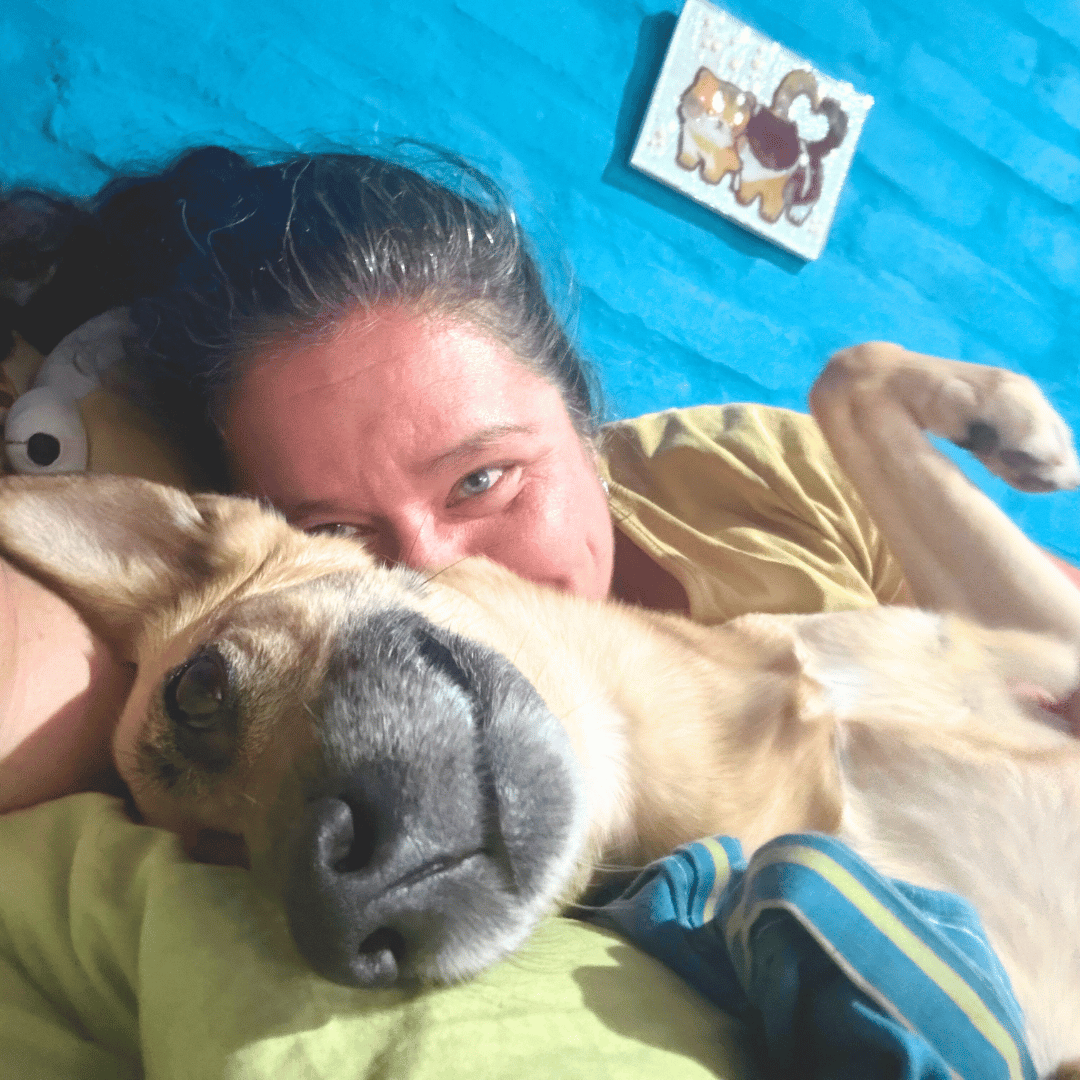
Dog training commands don’t have to be limited to one form, they can be hand signals, voice commands, or even words in another language. Some trainers (and clever dogs!) use a mix of all three.
My own dog, Callisto, is a perfect example. She’s my best friend and my most patient training partner, and she’s trilingual! Callisto understands commands in English, Spanish, and even hand signals. She’s the cutest when she tilts her head trying to decide which version I’ll use next.
Sometimes I’ll say “sit,” other times “sentada,” or I’ll just raise my hand (using the sit hand signal), and she nails it every time. She even knows when I’m talking to her, whether I call her by name or just say, “Hey, girl!”
Training can be both fun and flexible. Your dog doesn’t care what language you use, only that you’re clear, consistent, and connected.
List of Advanced Dog Training Commands
If you already taught your dog the 7 most essential dog training commands, then it is time to step it up! For most of these advanced commands you won't need to know more, just practice a different set of skills. When you move on to the advanced, working or tricks commands, you may want to learn clicker training and shaping.
Need to review dog training methods: Luring, Capturing, Shaping, Target Training and how to get a reliable dog command!
30 Advanced Dog Training Commands
| Command | Best Method to teach it to your dog | Description |
|---|---|---|
| 1. Take-it | Capturing | Take or grab an object or item in its mouth. |
| 2. Drop-it | Luring, then capturing | Drop or let go of an item in your mouth. |
| 3. Leave-it | Capturing | Do not grab or approach and object or individual. |
| 4. Kennel | Capturing, could start with luring if necessary. | Go to your kennel |
| 5. Go to Bed | Capturing, could start with luring if necessary. | Go to your mat or bed and relax. |
| 6. Target or touch beginner | Lure then capturing, or capturing from the beginning. | Touch my hand/fist with your nose. Alternative, touch a target stick with your nose. |
| 7. Gentle | Capturing | Take a treat or object with your mouth gently, without biting. |
| 8. Go potty | Capturing | Pee on command. |
| 9. Heel | Luring, then capturing. If you are a skilled trainer capturing from the beginning. | Walk next to me at the same speed. Dog should not be lagging behind or walking ahead of the person. |
| 10. Turn left on heel | Capturing | The dog turns left as you also turn left on heel position. |
| 11. Turn right on heel | Capturing | The dog turns right as you also turn righ on heel position. |
| 12. Back-up on heel | Capturing | Walk backwards on heel position. |
| 13. Fast on heel | Capturing | Walk at a faster pace on heel position. |
| 14. Slow on heel | Capturing | Walk at a lower pace on heel position. |
| 15. Watch | Luring | Look at me, it could be in a stationary position or while walking on heel position. |
| 16. Wait | Capturing, maybe use a body block. | Pause what your are doing momentarily. Tells your dog to wait for you to reach him or her. |
| 17. Still | Capturing | Stay still in the position you are. This command indicates the dog to freeze in place. |
| 18. Fetch | Capturing | Bring an item to me and place it in my hands or indicate place. |
| 19. Put away | Shaping | Put your toys away in a designated box or place. |
| 20. Stop That! | Luring or capturing depending on the case. | Similar to Leave-it, the difference is that the dog is already engaging in an unwanted behavior and we ask him/her to stop. |
| 21. Speak | Capturing with a stimulus that makes the dog bark. | To bark on command. |
| 22. Quiet | Luring, then capturing. In some cases it can also be capturing alone. | To stop barking on command. |
| 23. Go to Sleep | Capturing | Go to your mat or bed and lay down to relax or sleep. |
| 24. Touch an object or person | Capturing | Touch the object or person that I am pointing at. |
| 25. Chin rest | Capturing, targeting or Shaping for more advanced behavior. | Lower your chin to the floor or surface. |
| 26. Find keys | Capturing and Shaping | Find my lost keys |
| 27. Wipe your paws | Capturing and Shaping | When the dog comes home from a muddy walk, to wipe its pays on a rug. |
| 28. Bring your dish | Capturing and Shaping | Bring your empty dish to me. |
| 29. Bring me ... an item | Capturing and Shaping | Bring me the item I ask for (Newspaper, Sleepers, tissue paper, etc.) |
| 30. Ask for permission | Capturing | Technically not a command, but your dog should know this in certain situation (like out for walks). |
List of dog training commands free PDF
Sign up to "The Yes Dog" our Monthly e-newsletter and receive a FREE printable PDF list of 70+ dog training command in English and German.
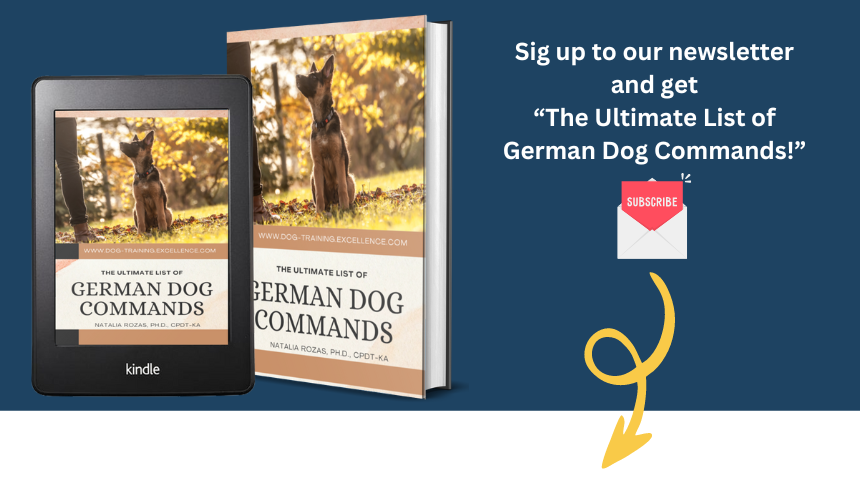
Sign up to The Yes Dog!

Our newsletter name ("The YES dog") was created to promote positive dog training methods (say -yes- instead of punishment) and the acronym also tells you what you will get into your inbox:
Yeehaw with your dog (find joy with fun activities)
Explore dog science (learn about your best friend)
Sayings that inspire (a quote to help you bond with your dog)
Working or Sports Dog Training Commands
Your dog may not be a working dog (police, military, search and rescue, tracking or scent work, service, for the blind, therapy, etc.) but many of the skills taught to these dogs can be very useful too. Also, dogs that play sports like agility and disc-dog learn certain commands that can be useful, fun and will definitely make your dog smarter and more resourceful!
33 Working or Sports Dog Training Commands
| Command | Best Method | Description |
|---|---|---|
| 1. Search/Find | Capturing and shaping | Find a lost item or person or search an area for a specific odor. |
| 2. Track | Capturing and shaping | Follow a scent trail. |
| 3. Stop | Capturing and shaping | When the dog is in active movement, we ask them to stop in their tracks. |
| 4. Crawl | Shaping | Move forward with your belly touching the ground. |
| 5. Attack | Capturing and shaping | Jump and grab the arm of the person threatening me. |
| 6. Guard | Capturing | Guard and protect and area, a person or a group of animals or people. |
| 7. Howl | Capturing | Howl on command. |
| 8. Growl | Capturing | Growl on command |
| 9. Jump | Luring | Jump over an obstacle |
| 10. On top | Luring | Jump on top of an elevated surface and stay there. |
| 11. Under | Luring | Go under an obstacle |
| 12. Through | Luring | Go Through an obstacle, example: agility tunnel |
| 13. Jump Through | Luring | Jump Through an obstacle, example: hoop or your arms |
| 14. Go in | Luring | Get inside a box like obstacle. |
| 15. Two paws | Luring | Place two paws on top or inside an obstacle. |
| 16. Go around clockwise | Luring, then capturing | Go around an object or obstacle in a clockwise manner. |
| 17. Go around counterclockwise | Luring, then capturing | Go around an object or obstacle in a counter-clockwise. |
| 18. Turn left (ahead of human) | Luring, then capturing | While the dog goes ahead of the person, the dog has to turn to it's left side and continue. |
| 19. Turn right (ahead of human) | Luring, then capturing | While the dog goes ahead of the person, the dog has to turn to it's right side and continue. |
| 20. Onwards | Capturing | This is a signal to keep going forward. |
| 21. Teeter | Capturing | This is a signal for the dog to walk or run above a see-saw type obstacle. |
| 22. Weave | Capturing and shaping, luring for beginners | Slalom in between poles or objects in a row. |
| 23. Outside | Luring | This is a signal to tell the dog to go outside. |
| 24. Inside | Luring | This is a signal to tell the dog to go outside. |
| 25. Hold it | Shaping | Your dog should grab and hold in its mouth an item or object. |
| 26. Carry | Shaping | Carry an item in your mouth (for example: a basket, bag, etc). |
| 27. Go to person | Luring or capturing | Your dog goes to the person you are signaling. |
| 28. Open a door/drawer | Shaping or target training | Open a door by putting your front paws on the handle. |
| 29. Close a door/drawer | Shaping or target training | Close a door by pushing it with your nose. |
| 30. Bring me a soda/beer | Shaping and chaining | Open the fridge, bring me a soda/beer, then close the fridge. |
| 31. Lights! | Shaping or target training | Turn the lights on or off. |
| 32. Point | Capturing and shaping | Point to alert me of something (Ex: point to where an animal is to hunt). |
| 33. Alert | Capturing and shaping | Alert the owner of something important (Sound for people with hearing disabilities, low blood sugar for people with diabetes, imminent migraine or seizure for people with migraines or prone to seizures, etc.). |
Chuckit! an Ultradurable Fetch Stick
 |
Built for endless games of fetch, this durable toy is tough enough to handle power chewers yet gentle on teeth and gums. Its bright orange color makes it easy to spot in grass, dirt, or water, and its lightweight design means you can throw it far, without straining your arm! ✨ Why you’ll love it:
|
Trick Training Commands for Dogs
Trick training is the most fun! Why? Because when you teach tricks to your pet, you are not pressured by your dog's ability to quickly grasp something and stop doing a "bad" behavior, you are just having fun. Teaching your dog trick commands is a great to bond and keep your dog sharp and motivated.
40 Trick Training Commands
| Command | Best Method | Description |
|---|---|---|
| 1. Shake hands (Paw) | Luring and capturing | Ask your dog to place its paw on your hand while you shake it. |
| 2. Belly/ Dead (Play dead) | Luring | Cue to ask your dog to lay down and show his/her belly, aka "play dead" |
| 3. Roll Over | Luring | Command to ask your dog to roll-over on the floor. |
| 4. High-five | Capturing | Ask your dog to give you a high-five |
| 5. Wave "goodbye" or "hello" | Luring or shaping | Wave with your paw. |
| 6. Sit pretty or beg | Luring | To raise both paws up front while the rear remains on the floor. |
| 7. Bow | Luring | Take a bow, the dog lowers its fron shoulders while living it's rump up. A play-bow. |
| 8. Spin | Luring | Spin around in a complete circle clockwise. |
| 9. Twirl | Luring | Spin around in a complete circle counter-clockwise. |
| 10. Go hide | Shaping | Ask your dog to hide behind a wall or big piece of furniture. |
| 11. Jump into my arms | Shaping | Usually for small dogs, ask them to jump into your arms. |
| 12. Weave | Luring (for beginners), Capturing (with the right set up), Shaping | Weave through my legs. |
| 13. Kiss | Capturing | Ask your dog to kiss you or lick you on your cheek. |
| 14. Shake your body | Capturing | Dog shakes as if it was trying to shake off water. |
| 15. Say your prayers | Shaping | Dog puts both front paws on an elvated surface (like a bed) and lowers it's chin down as if in prayer. |
| 16. Handstand or Spiderman | Shaping | Dog climbs a wall with its bag legs. |
| 17. Peek-a-boo or bridge | Luring | Dog moves around the person and comes half way through its open legs looking up. |
| 18. Tuck yourself in bed | Shaping and reverse chain | Dog lays down on a blanker, grabs a corner of the blanket and rolls-around covering himself with it. |
| 19. Yawn | Capturing | Cue that tells your dog to yawn. |
| 20. Limp | Capturing or Shaping | Dog walks with a limp front paw. |
| 21. Find your leash | Capturing | Ask your dog to find the leash and bring it to you. |
| 22. where is your ball? | Capturing | Ask your dog to find a ball and bring it to you. |
| 23. Stand in two legs | Luring | Cue for your dog to stand on its back legs only. |
| 24. Moonwalk | Shaping | Cue for your dog to walk backwards in a bow position. |
| 25. Whisper | Shaping | Bark very softly |
| 26. Tell me a secret | Shaping | Put you nose in my ear while I cover it with my hand as if dog is telling you a secret into your ear. |
| 27. Ring a bell | Shaping | Ring a bell with your paw. |
| 28. Smile | Shaping | Curl your lips up as if in smiling. |
| 29. Balance on your head | Shaping | Balance and object on your head |
| 30. Balance on your nose | Shaping | Balance and object or cookie on your nose |
| 31. Take socks off | Shaping | Pull socks of my feet with your mouth without biting. |
| 32. Send a message | Shaping | Take a note to someone else. |
| 33. Play piano | Shaping | Play the piano with your paws. |
| 34. Walk on two legs | Shaping | Walk on your two hind legs standing tall. |
| 35. Walk on my toes | Shaping | The dog stands under your legs, puts its front legs on top of your feet and you walk together. |
| 36. Leap over people | Luring and shaping | The dog runs and jumps on a person's back (person on four on the floor) to jump even higher. |
| 37. Go around me | Luring | The dog walks around the person. |
| 38. Jump the rope | Capturing and shaping | The dog jumps the rope with the person. |
| 39. Play basketball | Capturing and shaping | Pass the ball to your dog (dog sitting in "sit pretty position"), dog has to push it with its front legs to pass it back to you. |
| 40. Act ashamed | Capturing and shaping | Dog places one paw over its nose while looking down as if ashamed. |
The Future of Dog Training "Commands"
Cue is a better word
It's all about giving our pets choices and let them decide. When animals (including humans) have the choice to make a decision, they feel empowered. Dog training is heading that way because as we give out pets the chance to make a guided decision, they tend to choose what we wanted anyway! And their lives are better for it too.
This page is titled "Dog training commands" because that is the most popular search term. However I want you all to know that dog training is constantly changing and improving, specially as more and more humane methods are discovered and we understand more and more about dog behavior.
The term "command" was originally used in dog training when this discipline was about "the dog MUST do what I ask because I AM THE BOSS". We have now moved away from that type of training, the dominance and alpha theories have been disproved and we understand that positive reinforcement is easier, less dangerous and more fun to use with our pets.
In light of these changes a lot of trainers are choosing to use the word "cue" instead of "command". Why is this? the word command implies that the dog must do what I say but the word cue leaves a little room for choice. And this is where the future of dog (and animal) training is heading. When we train out pets and give them choice and decision power, their lives are enhanced and they feel better and more eager to participate. This may seem a little crazy if you are just beginning to learn about dog training but I promise it will start making more and more sense as you keep learning.
Dog training without commands
One of the important aspects of this movement towards and even more positive dog training world, is to teach dogs to make the right choices when facing a situation.
Did you know that dog training can be MORE than teaching your dog commands? There are many things you can teach your dog to do on its own, meaning you are giving the dog control over his/her own life and choose what to do in a specific situation (of course you will also teach your dog to MAKE THE RIGHT CHOICE!).
Examples of this are to train your dog to:
- Not jump on people when they come in the home (they dog doesn't need to do anything specific, just NOT jump).
- The commands leave-it, stay, settle and many others can also be taught without a "command". The idea is to teach the dog that those are the "correct choices" in certain situation and if they choose it, they get rewarded! But they have a choice!
- Consent training teaches your dog to let you know when he/she is uncomfortable and would like to stop. For example, you can teach your dog to receive eye drops, but with the possibility to let you know to stop and then continue when he/she is ready.
Start your journey towards consent training with The Bucket Game (See Youtube video below!).
Recommended Dog Training Commands Books
If you are enjoying learning about dog training but want more! Here are some of my favorite books on the subject.
The Culture Clash
This is a must read book for any person with a dog. Jean Donaldson is an excellent writer that explains how dogs learn in a fun and easy way. The book also has tutorials of how to train many dog training commands at the end. | |
When Pigs Fly
Maybe you have a dog that seems impossible to train, maybe you have tried to teach your pooch a few things but he does what he wants instead. This is a great book for you then! A well written and excellent book to understand why our dogs seem "stubborn" and how to work with them and achieve the training we want. |
|
Agility Right From the Start
If you are ready for some advance work with your dog, agility is a great sport to begin. You don't need to compete or even have a big backyard to start. This book will tell you how to train your dog to go through the basic agility equipment with positive and fun methods. It's a great book to read and teach your dog agility specific dog training commands. |
|
Best Dog Training Books
If you are looking for the best information about dog training, this list of best dog training books has the titles that only professional dog trainers will recommend! As a Certified Professional Dog Trainer I have read them all (and more) and trust me, you will learn amazing things! |
|
Ready to Train Your Puppy the Smart Way?
I’m Dr. Natalia Rozas, Certified Professional Dog Trainer and Neuroscientist.
The NeoPuppy Program combines 80+ short videos and 4 online private coaching sessions so you can train your puppy effectively and kindly, backed by science.
✅ Train at your own pace
✅ Personalized online guidance
✅ Results without stress or punishment
👉 Explore the NeoPuppy Program
This article was written by Natalia Rozas, Ph.D. and Certified Professional Dog Trainer (CPDT-KA #4071465) and updated on March 28th, 2024. Case studies and anecdotes are real but to protect the privacy of our clients the names and details are changed.
- Home
- Dog Commands
